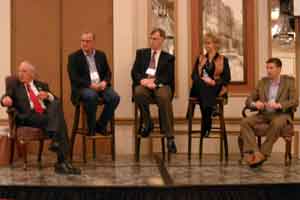Mixed Reviews from Small Fleets on ELDs: '10% of Our Force Quit,' Says One

The final rule from the Federal Motor Carrier Safety Administration, published in December, will bring to an end the era of paper recordkeeping for driver hours of service. While many fleets and drivers already have adopted the automated process and even find it desirable, others declare it to be anathema and vow never to work under the rule’s terms.
PHOTO: From left, ACT Research Co. seminar fleet panelists Tommy Hodges of Titan Transfer, Jim Subler of Classic Carriers, ACT moderator Jim Meil, Sherri Garner Brumbaugh of Garner Transportation Group and Jeff Shefchik of Paper Transport.
ELDs popped up repeatedly at the ACT Research Co. seminar March 30 and March 31, with ACT President Kenny Vieth saying it would generate a noticeable decrease in fleet capacity, a technology vendor explaining that the rule is complex but the devices are useful, and a panel of fleet executives swapping stories about efficiency improvements and retirements from trucking.
ELDs are wired directly to a truck’s engine and their usage will make it very difficult — but not impossible — for drivers to cheat on hours of service. Vieth said this could reduce hauling capacity by for-hire carriers, perhaps by up to 7.9%.
Fleet executives agreed that adopting the devices is an arduous process with a steep learning curve that taxes dispatch and other operations personnel even more than drivers. Beyond that there was a wide variety of experiences.
Tommy Hodges, chairman of Titan Transfer, said “10% of our driver force quit” after the Tennessee-based truckload carrier adopted ELDs in 2010. He also said there was a 6.8% productivity drop for six to eight months.
“You have to plan a driver’s week, a week in advance,” he said.
Hodges said many of his drivers left for non-ELD companies, but he wonders what they’ll do once their use becomes universal.
Sherri Garner Brumbaugh, president of Garner Transportation Group in Ohio, said adoption included a “huge learning curve,” but if her drivers’ ELDs go down, “they’re calling into the office” because they don’t want to deal with paper anymore.
She echoed the need for better schedule planning. “We’re planning 24/7,” Brumbaugh said.
Jim Subler, president of refrigerated hauler Classic Carriers, said ELDs don’t work well with his multistop delivery model.
Jeff Shefchik, president of Paper Transport in Wisconsin, said he thinks some companies will close and some drivers will retire, but many indignant exits from trucking will prove to be temporary.
“Drivers will drive. They might be angry at home for a week, but then their wives will tell them to get their butts back to work because they need to bring home a paycheck,” Shefchik said.

